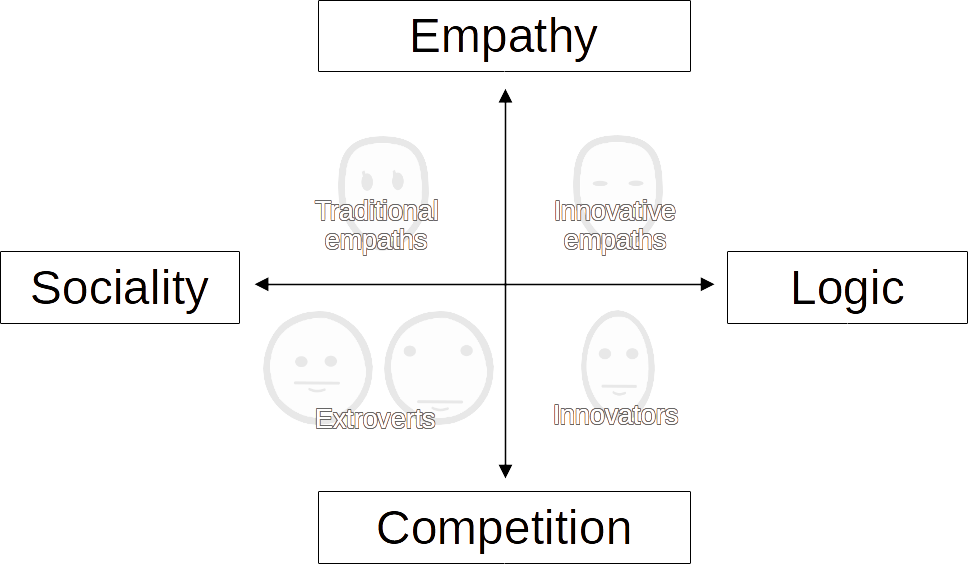Recently, I have been fascinated with the concept of mental duality. It allows us to understand how our minds work. Today, I will introduce examples of our inner problems with that concept.
By the way, I created the tag #mental duality. You can refer to past articles through it.
How to create mental comfort
Sometimes, we want to live with mental comfort. We could have many mental problems, such as blaming our past failures, unstable emotions, not knowing what we want to do, or a lack of confidence.
Although there are many methods to improve our inner condition, they often don’t work or work only in the short term.
That makes us want to know how our minds work. Logic allows us to create new methods based on our problems and deal with them better.

However, we often don’t know mental logic. That keeps us searching for a superficial methodology.
The concept of mental duality could tell us how our minds work. Today, I will explain the examples. They might show us how to solve our inner problems.
The concept of mental duality
Let’s introduce the concept of mental duality again, although I mentioned it frequently in recent articles.
Mental duality is the concept that we have at least two contradictory senses to our values. Each person could have different ones. That shapes the person’s personality.
I like to classify them into the following four senses: competition, sociality, empathy, and logic. Their relationships are as shown in the following image:

If we are people with empathy and creativity, we have two aspects of our senses: empathy and logic.
Contradictory aspects
They often cause inner conflict because they are contradictory. Empathy is judging based on images or emotions, such as dreams, hopes, anger, excitement, or likes and dislikes. On the other hand, logical sense is based on reality and rationality, such as calculation, numeric comparison, or efficiency. We often experience the struggle between a dream and reality.
Although those inner conflicts stress us, we need them to live socially because they allow us to adapt to social changes. Empathy is a way to live in a stable society. Logical sense is a way to live efficiently outside society or in a turbulent era. They allow us to adapt to environmental changes flexibly.

In other words, our minds are inconsistent. For example, there are moments when we feel like having fun without considering it deeply, and there are times when we want to take life seriously. Although we don’t know why, we often experience our moods changing. That is natural. That is the inconsistency.
We need to live while caring about our two contradictory wants. Handling them well is the key to solving mental problems and living comfortably.
Two approaches to communicating with people
However, we sometimes misunderstand that we are consistent.
The cause is that we confuse social communication with communication with ourselves. There are two approaches to communicating with people, including ourselves.
- Showing only one aspect of our values lets others recognize our consistent values. That makes social life easier, but we often sacrifice ourselves if we have a minor personality.
- Caring about two contradictory sides of ourselves allows us to satisfy and balance our inconsistent wants. Although many cannot understand our inconsistency, that makes our lives easier.

In other words, the ways of satisfying others and satisfying ourselves are different.
If we confuse them, we often misunderstand that we should be consistent and focus on only one aspect. In addition, we tend to believe that satisfying others is the only way to fulfill ourselves.
Dealing with our inner problems
That mental logic tells us how to deal with our inner problems.
One example is why forgiving ourselves doesn’t improve our minds. We often want to forgive ourselves for what we cannot do. Although we might have tried to do it many times, it usually doesn’t work.
That is because we judge it on only one aspect.
If we understand that we have at least two aspects, we don’t care because one aspect complements the others. They are contradictory but complementary.

For example, assume we want to fish. If we know we can catch fish with both a fishing rod and a spear, we don’t mind if we are exhausted by rod fishing. We know we can spearfish at such a time. They are complementary. We don’t have to persuade ourselves, “Forgive me for my incompetence.” The other side helps us when we reach the limit on one side.
That naturally allows us to be ourselves.
The reason why our surroundings don’t understand our true nature
Another example is trying to get our surroundings to know our hearts. We often want people around us to understand our complex minds, especially when we have an inferiority complex.
However, they usually cannot understand our complexity because they judge us by only one aspect.

The factor of the problem lies inside us. Ignoring our duality makes us show others only one aspect. That causes our mental suffering. That is why our surroundings usually cannot understand our contradictory wants, no matter how we explain, as long as we ignore our mental duality.
Unreliable judgments of others
A lack of confidence sometimes drives us to know who we are by seeing ourselves from others’ perspectives.
We sometimes believe that the image of ourselves seen by others is our individuality. Some might say, “Surrounding people know more about you than you do.”
However, that is not precise because we have at least two aspects and tend to show our surroundings only one aspect. Our surroundings can usually easily find our clear values, but they cannot understand our duality.

If we have a minority nature and follow the advice of those around us, it often accelerates our confusion.
In that case, thinking of ourselves by considering mental duality would solve the problem.
The reason for an inheritance of confusion
The concept of mental duality tells us why an inheritance of confusion occurs. For example, children often inherit an inferiority complex from their parents.
Perhaps it is because parents force children to behave consistently. Parents believe that we must be integrated in one aspect. That forces children to try to be consistent.

That makes us prefer to be clear about good or evil. We cannot accept ambiguity, either for ourselves or for others.
The reason for other mental problems
That causes many mental problems.
Sticking to being ourselves is also an example. If we understand our mental duality, we don’t stick to being ourselves because we can find that there is no such thing as “being myself.” We can change our behaviors based on our mood without convincing ourselves.

If we have healthy minds with accepting mental duality, we judge things by comfortable or not. Sometimes, it is a painful way of life for others, but it can feel easy for us. That leads us to our distinctive way of life.
Conclusion
The concept of mental duality tells us how our minds work. The above are examples.
It might show us how to solve our inner problems.
Thank you for reading this article. I hope to see you in the next one.


